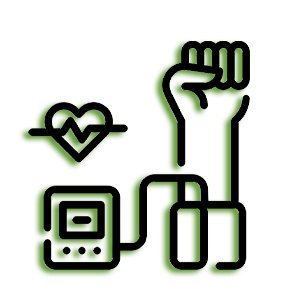
22 Jun HIGH BLOOD PRESSURE AND YOUR WEIGHT
Have you had your blood pressure tested lately? And if so, is it high?
The good news is if you do have high blood pressure, losing weight and making lifestyle changes can remedy the issue about 80 percent of the time. The bad news is, if you ignore high blood pressure you could be setting yourself up for some big health problems in the future. But first, what is high blood pressure and why is it so bad for you?
High blood pressure is similar to what happens when you put your thumb over a hose opening while the water is turned on. The constricted opening causes water to spray with more force or pressure.
When this scenario happens in the body, the added pressure causes the heart to work harder and harder to pump blood, which is what circulates nutrients and oxygen to all the cells of the body. As a result, the heart becomes enlarged, gradually increasing in size. Over time the heart becomes so big that it causes the pumping system to crash, a condition known as congestive heart failure. Other risks of hypertension include damage to your kidneys and eyes. Additionally, high blood pressure can lead to stroke by weakening your brain’s blood vessels and causing blood clots to form in the arteries flowing to your brain.
High blood pressure is often called the silent killer because while people don’t feel sick when they have high blood pressure, it’s nonetheless silently damaging their heart, cardiovascular system, kidneys, and other organs. In fact, many people can have high blood pressure for years, or even decades, without knowing it. But all that time, the damage described above is accumulating.
In addition to excess weight, there are many other factors that go into increased blood pressure. Some of these are predetermined by genetics, while others are environmental. Regardless of whether you have a genetic disposition for high blood pressure, you can control the external factors that can elevate it.
Weight loss in general is one of the most effective ways to control blood pressure, but here are some other specific tips that you can use in your everyday life to keep hypertension at bay.
Exercise
In addition to losing weight, exercise is a great way to achieve healthy blood pressure. Recent studies, including one conducted by the National Heart, Lung, and Blood Institute in 2017, suggest that participants’ blood pressure was lower on days when they exercised. While there isn’t one determined amount of exercise required to lower blood pressure, we recommend a goal of 30 minutes five times a week. This doesn’t have to be weightlifting or wind sprints, but just taking the stairs instead of the elevator or taking a walk around your neighborhood will suffice.
Watch Out for Sodium
A surplus of sodium will hold unneeded fluid in the body, placing additional stress on the heart, and ultimately driving up blood pressure. If you are confused about which foods you should watch out for and which to include, the National Institutes of Health recommends following the DASH diet, an approach created specifically to prevent and control hypertension. Understanding how much sodium is in the foods you eat can help you enjoy your daily activities without increasing your blood pressure.
Beware of Stress Indicators
According to the 2012 North American Association for the Study of Obesity, stress plays a major role in weight gain and subsequently, in high blood pressure. Whether it’s routine stress related to work, school, and other daily responsibilities, or stress brought about by a sudden negative change, such as losing a job or illness, your weight fluctuates with the pressures of your life. However, the quicker you recognize you are becoming stressed, the quicker you can relieve that tension. Take a few moments before you move to your next responsibilities to understand when you tend to get stressed. This will help you avoid those situations because even though stress doesn’t directly cause long-term high blood pressure, it can lead to many unhealthy choices that can affect your blood pressure.
Be Careful of Over-the-Counter Medicine
Many over-the-counter cold and flu medicines contain decongestants that may raise blood pressure. The over-the-counter medications for weight loss can actually contribute to high blood pressure by stimulating appetite and reducing energy levels. These also can have an adverse effect when combined with blood pressure medication, so it’s important to discuss with your doctor any and all medicines you may be taking. Having your blood pressure checked regularly by a trained medical professional is important to understand your risks.
That being said?
Take Your Medicine
If you’re on medicine to control your blood pressure, make sure you are taking it at all recommended times. Skipping, abruptly stopping, or taking your medicine at inconsistent times can increase your risk of stroke or heart attack while preventing the medicine from doing its job. Because it can be difficult to stay on top of the dosages and times to take medication, there are many apps, calendars, and reminders that can help you stay on track. You should also discuss ways you can be more consistent with your provider. Whatever your preferred method is, make sure you take your blood pressure medicine as prescribed.
So if you haven’t had your blood pressure checked in some time, do so soon. And if you have high blood pressure, you should do all you can to address the root cause often excess weight and salt intake so you can cross this serious health risk off your list of things to worry about now and in the future.


